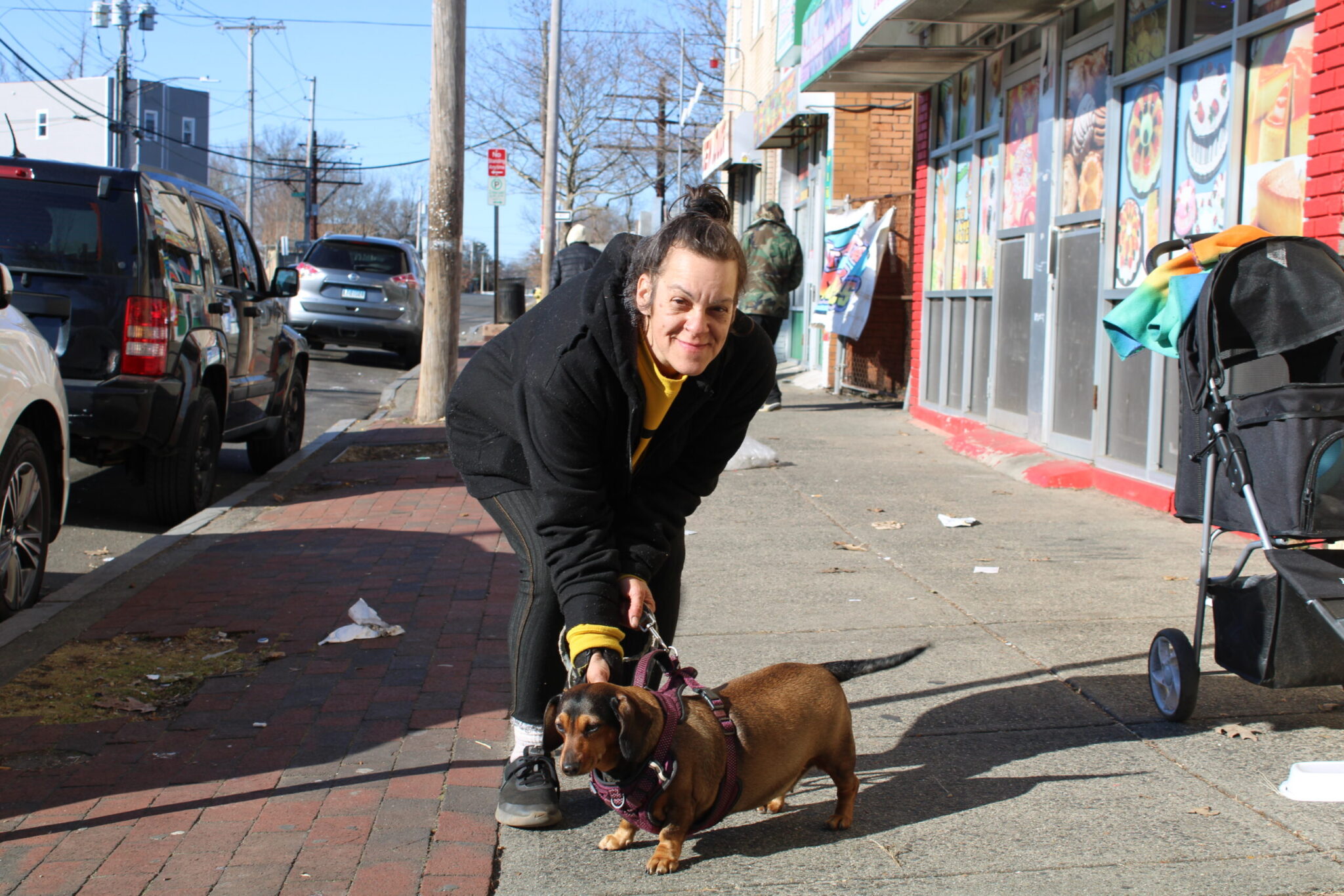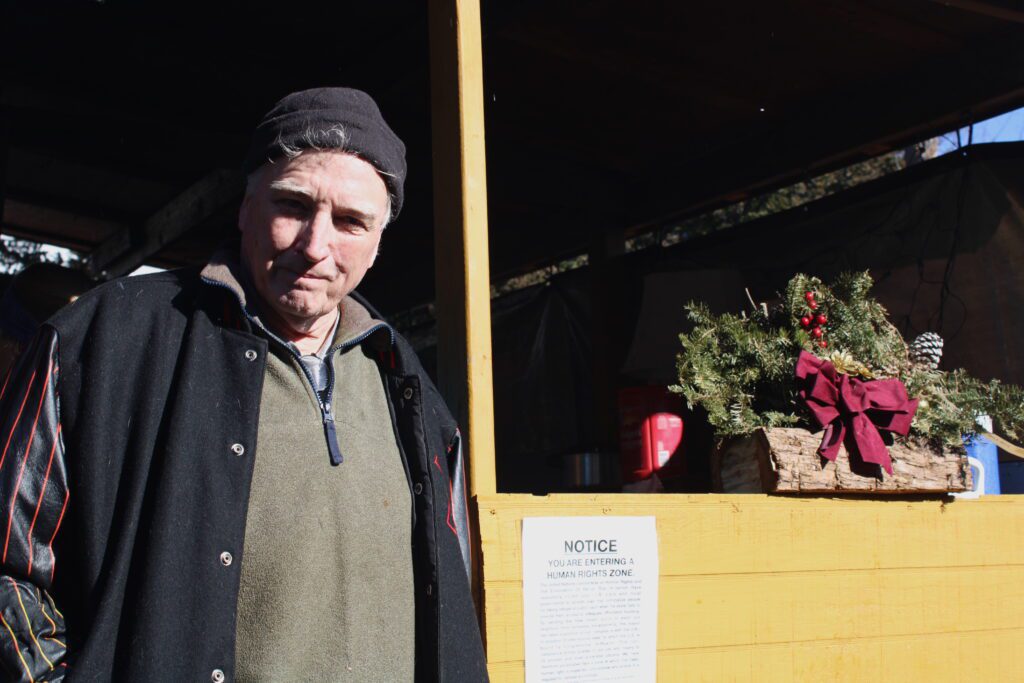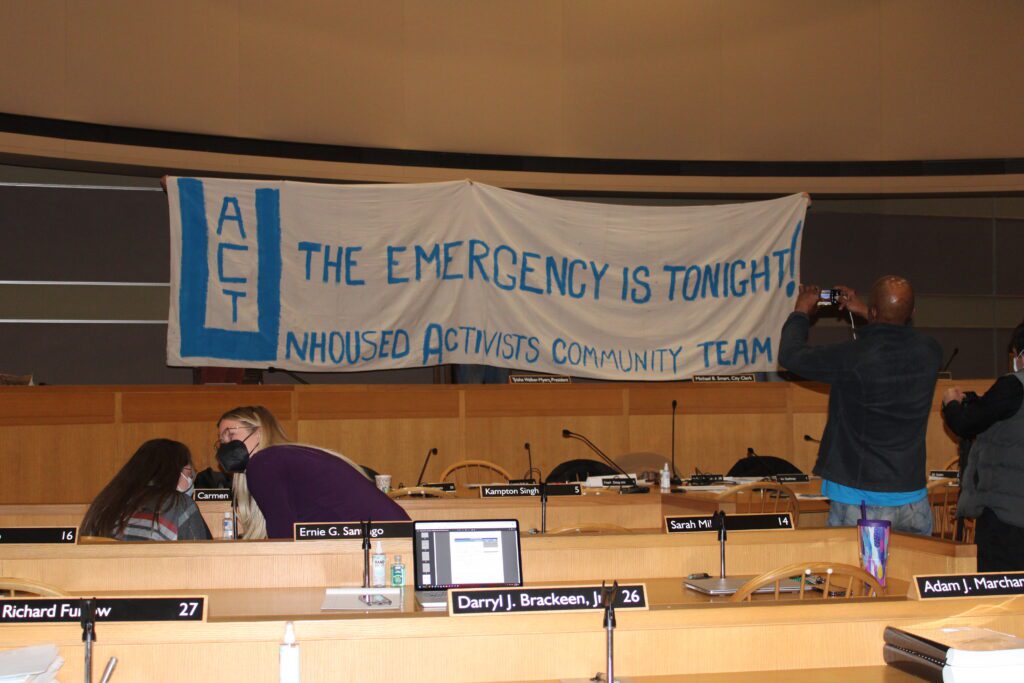Activists demand increased protections for New Haven tent cities
The activist group U-ACT is calling for an end to evictions from encampments on public land without an immediate alternative housing plan. The city says that’s a promise they cannot fulfill.

Maggie Grether, Contributing Photographer
Donna Abate and her dachshund, Baby T, are recognized figures around the Hill neighborhood in New Haven. Abate said that people often stop to greet her when she’s walking with Baby T, who she sometimes pushes in a stroller.
Abate has been homeless since the summer, when she found herself without an apartment and with few belongings other than the clothes on her back. Now, Abate lives with her boyfriend and Baby T in a tent in the backyard of the Amistad Catholic Worker House on Rosette Street. Amistad is the home of Mark and Luz Catarineau Colville — two activists who have opened their backyard to unhoused people looking for a place to live.
“I never thought I could survive on the street, but I’m doing it,” Abate said. “Amazingly, I’m doing it, with other people’s help.”
Frustrated by the city’s refusal to legalize tent cities, the Colvilles decided last spring to open the space behind their house for people to live in tents. Mark Colville estimated that around ten people are living in the backyard right now.
Colville has been working as an activist for unhoused people in New Haven since 1994. Central to his activist philosophy, he told the News, is the idea that individuals should have the right to seek refuge on public land. He sees homeless encampments, or tent cities, as an important form of transitional housing, where unhoused people can live in community and learn how to be neighbors before moving to more permanent housing.
“We’re not giving you a tent, we’re giving you a piece of land,” Colville said. “Of course, we’re not talking about a legal relationship, but it’s a handshake, it’s an agreement. That land is yours; I don’t have a right to go in there.”

Every morning, Colville serves hot breakfast at Amistad — he also provides free lunch each Tuesday on the New Haven Green outside City Hall. Last Tuesday morning, breakfast at Amistad was coffee, quiche lorraine, sausage and cinnamon raisin toast. Volunteers and residents gathered around a woodfire in the yellow shack at the center of the backyard to eat.
Colville is an organizer with New Haven’s Unhoused Activist Community Team, or U-ACT, an activist group formed by unhoused people and allies. U-ACT has created a petition demanding that the city stop evictions from encampments on public land without providing an immediate alternative place to stay. U-ACT also advocates for permanent public bathrooms and free permanent public showers. One of the group’s slogans, Colville noted, is “the emergency is tonight.”
“Everything we do [to address homelessness] is on an emergency basis,” Colville said. “It’s all temporary. Emergency money, overnight shelters, porta potties, paper plates. People who are homeless are fed up at this point.”
Mayor Justin Elicker said the city cannot make a promise to end all evictions from public spaces. Elicker said the city will remove encampments if they pose a public safety issue; for instance, if people are using flammable heat sources in tents, or if there are instances of violence or large amounts of trash and debris around the area.
“Encampments are something that have popped up from time to time all over the city for many, many years,” Elicker told the News. “We typically don’t engage unless there is a problem of public safety.”
New Haven Community Services Administrator Mehul Dalal, said that when the city removes an encampment, they post signs to notify residents in advance and work with partner agencies that specialize in homeless outreach to “engage with clients.”
Dalal said that while city administrators wish they could ensure a spot at a homeless shelter for evicted residents of tent cities, shelter bed shortages mean that such an offer is not always possible.

While activists and the city appear to be at an impasse on the issue of tent city evictions, U-ACT member Billy Bromage said that plans have progressed to erect public bathrooms on the New Haven Green.
According to Bromage, the city has submitted a proposal to the Connecticut Department of Economic and Community Development for the construction of one to two public bathrooms on the Green. The bathrooms would be managed by the Town Green Special Services District, which approximates that the project would require two to four additional staff members, with an annual maintenance cost of $78,000 per hire.
Bromage said the group is also asking for storage lockers to be installed in downtown New Haven, so people without homes can safely store their belongings. These lockers would also help unhoused people avoid the stigma that comes with carrying their belongings with them.
On Wednesday, members of U-ACT, alongside other community members involved in supporting unhoused people, gave public testimony at a Board of Alders hearing about the allocation of a $4.8 million grant from the Department of Housing and Urban Development to help people experiencing homelessness. The grant was announced in April 2021, and the city’s deadline to submit an allocation plan to use those funds is March 31.
During the hearing, members of U-ACT held up a large, hand-painted banner in the Aldermanic chambers that read “THE EMERGENCY IS TONIGHT!”

U-ACT member Tyrell Jackson introduced himself in his testimony as a political representative for the tent city on Ella T. Grasso Boulevard. Jackson talked about the precarity of life in a tent city, where food and clothing donations can disappear at any moment and the threat of eviction hangs overhead.
“While most of you guys get to go to your nice houses, nice cars to see your families, I’m going to a tent,” Jackson said in the hearing. “It’s still wintertime out there. My problem is tonight.”
The number of people experiencing homelessness in Connecticut increased by 13 percent between 2021 and 2022.







